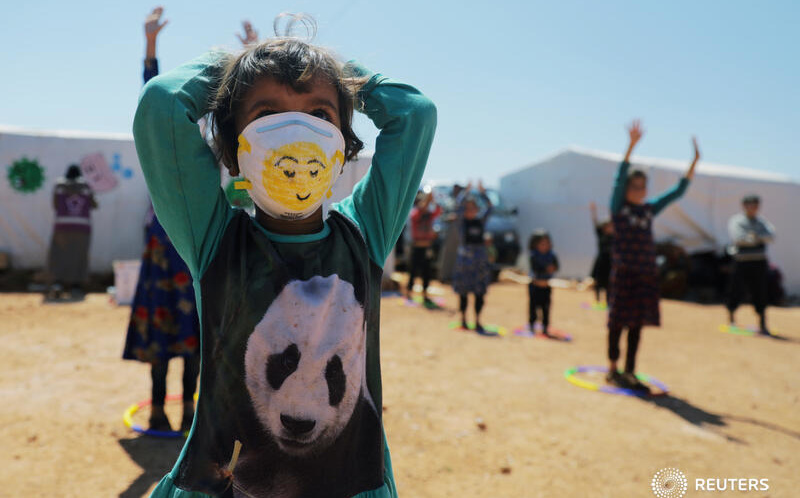A displaced girl at a camp in northern Idlib Province, Syria, April 14, 2020 (Khalil Ashawi/Reuters)
UPDATE, JUNE 4:
The US Ambassador to the UN, Linda Thomas-Greenfield, has emphasized that Russia must not block the last aid crossing into Syria.
Thomas-Greenfield spoke in a televised interview on Thursday, after her visit to the Turkish-Syrian border and talks with officials, Syrian refugees, UN agencies, and humanitarian NGOs.
A number of NGOs…talked about the desperation of people on the other side of the border, and that they know that if this does not continue, that they stand a chance of dying….
I feel very confident that I can convey what all of the Security Council members will need to hear, and that is that what is happening here is needed, and it is being provided in an efficient way that saves lives.
She did not explain how the US could prevent the Russian veto in the Security Council to keep the Bab al-Hawa crossing from Turkey open after July 10. Moscow has used the veto to close the other three crossings from Iraq and Turkey, on which millions of Syrians — many of them displaced and living in camps — have relied for subsistence.
Asked if President Joe Biden plans to raise the issue with Russian leader Vladimir Putin during their June 16 summit in Switzerland, Thomas-Greenfield said she did not know what is on the agenda. She said Biden is “strongly committed” to continuation of the aid through Bab al-Hawa.
About 1,000 trucks with humanitarian aid supplies pass through the crossing each month. The UN says around 3/4ths of 4 million people in northwest Syria rely on the supplies for basic needs, with almost y 85% of them reached each month.
Thomas-Greenfield addressed Russian officials: “I have seen firsthand the importance of this border crossing, and the needs that are being addressed in this border crossing, and you don’t want on your shoulders the desperation of the people on the other side of the border.”
ORIGINAL ENTRY, JUNE 2: As Russia and the Assad regime prevent aid to opposition areas of Syria, the US Ambassador to the UN is visiting the Turkish-Syrian border area.
Linda Thomas-Greenfield is making the trip as Moscow threatens to close the last border crossing into northwest Syria, threatening more than 4 million people.
During the three-day visit, Thomas-Greenfield will meet with senior Turkish officials, a group of Syrian refugees, UN agencies, and aid groups.
A US official said Thomas-Greenfield will “convey the United States’ strong support for humanitarian access into Syria….Nothing could be more urgent than continuing to provide life-saving aid through the cross-border mechanism….This has grown even more significant and more dire.”
The UN Security Council authorized aid in 2014 through four border crossings in northwest and northeast Syria.
But Russia, supporting the Assad regime’s to besiege and overrun opposition areas, used its Security Council veto to reduce the crossings to two and then one. Assistance through all points from Iraq into Kurdish-controlled northeast Syria was blocked, and only the Bab al-Hawa crossing from Turkey into the northwest is still operational.
The mandate for Bab al-Hawa expires on July 10.
See also Russia Uses UN Veto to Cut Aid to Millions of Syrians
“People Will Die”
Last week Mark Lowcock, the head of UN humanitarian operations, appealed to the Security Council, “The cross-border operation – which is a lifeline for more than 3 million people – cannot be substituted. We look to this council to ensure that that lifeline is not severed.”
Deputy US Ambassador Richard Mills said, “If we don’t, people will die. It is that simple. One crossing point alone cannot meet the mass needs of the Syrian people.”
But Russian Dmitry Polyanskiy defied reality to say that aid deliveries from Damascus were being ignored. He converted the civilians in Idlib into combatants, saying Western powers are “making it obvious that they do not intend to take any steps that would create problems for the fighters holed up in Idlib”.
The Assad regime, enabled by Russia, has waged protacted sieges on opposition areas throughout Syria’s 122-month conflict. The cut-offs, alongside intensive bombing and ground campaigns, have led to capitulations throughout the country.
The last major opposition area is in parts of Idlib and Aleppo Province. Many of the residents have been displaced from other parts of Syria, including those that were besieged.

